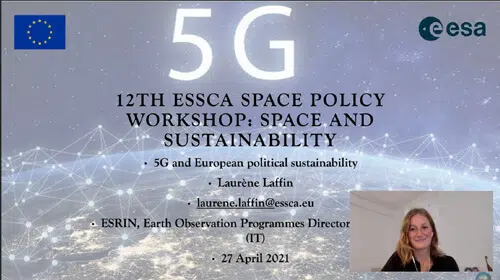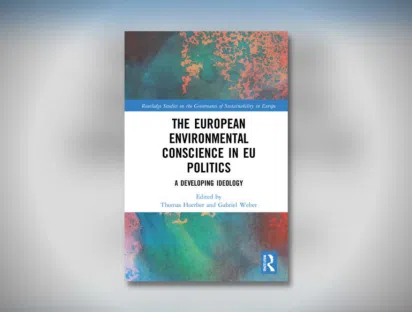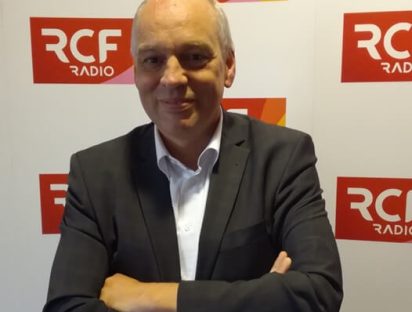The standing European Space Policy Group held its 12th workshop on “Space and Sustainability”, featuring the Master’s theses of two ESSCA students. EU*Asia Institute’s research assistant Robin Miquel took the opportunity to ask Laurène Laffin a few questions about her paper « 5G for a European Political Sustainability ».

Interview with Laurène LAFFIN – 28/04/2021 Presentation: “5G for a European Political Sustainability” From the 12th ESSCA Space Policy Workshop “Space and Sustainability”.
Robin Miquel: Your presentation was a part of the « Space and Sustainability » workshop. Speaking of space, you explained that satellites have an important role to play in the 5G ecosystem. Is it possible for you to explain in a few words how do they work for 5G, what is their role?
Laurène Laffin: The role of satellites for 5G will essentially be to improve connectivity, for the broadbands to be more efficient and to cover more territories. For example, now it’s a bit hard to have connectivity in isolated areas. Thanks to 5G it will cover all territories and way faster. So, it will be very useful for industries, like the healthcare industry that will be able to use 5G for surgical interventions. That is why satellites are so important.
Robin Miquel: Because of the so-called “satellite constellation”, can we say that 5G will influence the way that space is managed by European governments, especially at political and diplomatic levels?
Laurène Laffin: Well… That was the question I was asking myself when I started my research. I think that I’ve come to the conclusion that 5G is probably more like the impetus for us to create policies for space and to manage space differently. It’s not 5G in itself that will allow that: it’s 5G now but it will be 6G in a few years. It’s only because 5G is happening now that we will need political changes. For this reason, Europeans must seize the opportunity with 5G.
Robin Miquel: Are there any particularities of 5G deployment in Europe that are different compared to the rest of the world? Does the EU have any specific positions that are different from other countries, such as China or the USA?
Laurène Laffin: I think that the main difference with China or the USA is that they have their satellites for their own countries, whereas Europe is a very special union of countries. Although we work together as a union, we’re still individual countries, so it’s not always easy to come to an agreement on policy. That’s probably why the 5G deployment and organisation is very different in Europe.
Robin Miquel: Finally, you explain that 5G will have a positive impact on policy change. However, we hear a lot about possible risks such as the disruption of weather forecasts, health risks due to the higher frequencies, or the increase in energy consumption due to the 5G equipment… Do you think that these downsides can contradict the very principle of political sustainability?
Laurène Laffin: For me, political sustainability is connected with environmental sustainability: to have good political sustainability, the EU will have to work on environmental issues. Of course, this needs to be thought through. The EU has to work on these downsides. But I think that when a new technology comes, there are always some issues to “fight about” anyway.
Robin Miquel: And one last question, how did you choose this subject for your master thesis (and then your presentation today)? Is it a topic that you are personally interested in?
Laurène Laffin: First of all, in terms of European sustainability, I have always been interested in political issues and the EU in itself. I think it is really important for the EU to be strong as we have very strong powers around us. Then, the 5G topic came up because the theme of a master thesis is to fill a gap in the literature: 5G is very new, so I thought that it would be interesting to cover that subject. Also, because of Thomas Hoerber’s work, I created a research question related to this subject.
Robin Miquel: Alright, thank you very much Laurène! Thank you for this interview and for your compelling presentation!
For the interview with Maxime NICOLAS on the presentation of his Master’s thesis: “The Importance of Foreign Direct Investment of private companies operating in Space Industry”, click here.




